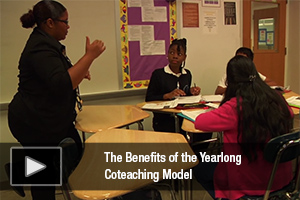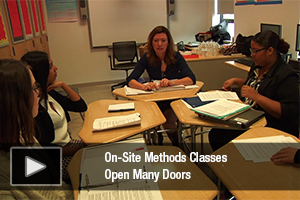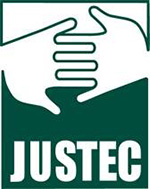06 Jun2017
By Dana Dunwoody

Since 1991, various iterations of the AACTE Holmes Program have catered to doctoral students from historically underrepresented backgrounds by providing conferences, mentoring, and other support. Since then, more than 700 Holmes Scholars have completed their terminal degree and moved beyond their student careers into research, policy, and academic positions across the nation. With Holmes’ growth into other education levels in the past 2 years, the Holmes Scholars Council is reaching out to our younger colleagues to determine their needs and how we might better tailor the program to meet them.
The Holmes community now consists of high school students (Holmes Cadets), undergraduates (Holmes Honors), master’s students (Holmes Master’s), and doctoral candidates (Holmes Scholars). To better serve all of our Holmes students, the council would like to hear from each member at the new levels – Cadets, Honors, and Master’s. Please encourage all of these Holmes students to take our needs assessment survey this month – it is anonymous and should take only 5-10 minutes to complete.
06 Jun2017
By Jerrica Thurman

The AACTE membership renewal season has officially begun! Each institution’s Chief Representative should have received an invoice via mail last month. Although the payment deadline is January 1, 2018, many of you have indicated you prefer to remit dues before your budget year ends in the summer – so we’ve made invoices available now for your convenience.
Your membership in AACTE, the nation’s largest network for educator preparation institutions, provides your faculty, staff, and students with access to valuable resources that help you achieve your program and career goals. Complimentary subscriptions, access to online resources, discounts for conferences and workshops, free continuing education opportunities, and inclusion in the membership directory are just a few of the benefits you’ve enjoyed during the past year.
06 Jun2017
By Shawn Karim
In the latest monthly episode of Education Talk Radio spotlighting AACTE member institutions’ work, the online radio show featured the work of three educator preparation programs to combat teacher shortages. Host Larry Jacobs was joined for the May 17 show by AACTE member deans Kim Metcalf from the University of Nevada-Las Vegas (UNLV), Patricia McHatton from the University of Texas-Rio Grande Valley (UTRGV), and Marcia Burrell from the State University of New York-Oswego (SUNY-Oswego) as well as Rod Lucero from AACTE.
Teacher shortages are plaguing many states and districts around the country, particularly in high-need fields and low-income schools. In addition to school-centered problems such as high teacher turnover and persistent gaps in the diversity of students and their teachers, preparation programs have experienced enrollment drops that further heighten the productivity challenge. “It has to do with, quite frankly, money,” Lucero said, noting that college students are leery of investing in an expensive degree for a career that lacks sufficient salary to repay their student loans, and some teachers start out earning below the poverty line.
05 Jun2017
By AACTE
AACTE issued the following press release today to mark the opening of the 2017 AACTE Washington Week:
(June 5, 2017, Washington, D.C.) – The American Association of Colleges for Teacher Education (AACTE) is hosting its 2017 Washington Week through Wednesday, bringing teacher educators from across the nation to Capitol Hill and to the Renaissance Arlington Capital View hotel in Arlington, Virginia. The conference, themed “Diverse Perspectives, Deep Partnerships, One Profession,” offers attendees opportunities to showcase their programs, discuss important education policies and advocate for educator preparation in meetings with members of Congress.
05 Jun2017
By Aaron Goldstein

Ed Prep Matters is pleased to bring you this special feature on state policy and AACTE state chapter activity. For the recap from April 2017, see this blog.
As the calendar shifts to summer, many states have ended their legislative sessions, while about a dozen legislatures remained active in May.
01 Jun2017
By Kristin McCabe
Today, AACTE welcomes Lynn M. Gangone to the position of president and chief executive officer. Gangone graciously took time during her first day on the job for this introductory interview for Ed Prep Matters:
Q: Your career has spanned a variety of higher education and association roles. What attracted you to AACTE?
A: AACTE’s mission is the first and foremost attraction. In my opinion, educators are the most important professionals in our society, and the opportunity to serve an organization dedicated to their preparation is unparalleled. Not only have educators made a difference in my life, but I have had the extraordinary fortune to “pay it forward” through my career as a faculty member and a dean. AACTE aligns so many facets of my lifelong work as an educator with service to and advocacy for educator preparation programs.
30 May2017
By Rebecca Gutierrez
Two new videos are available this week on AACTE’s Research-to-Practice Spotlight Series highlighting the St. John’s University (NY) School of Education clinical preparation program known as RISE. This week’s videos discuss the benefits of having an extra teacher in the classroom and of the methods class taught by SJU professors in the partner schools.


30 May2017
By Sharon Robinson
Leaving office as president and CEO of AACTE is truly bittersweet. First, the bitter part: After 12 years, I am acutely aware of many good reasons to retire from this office in spite of my abiding passion for the profession and causes of equity. At this moment, it is clear to me that my passion for the work is far outpaced by the energy required to get it done.
Now, for the sweet part (albeit severely summarized):
30 May2017
By Sungti Hsu
On May 12, AACTE President/CEO Sharon P. Robinson addressed U.S. and Chinese leaders from education, investment, and business sectors in Shenzhen, China, marking the launch of an investment fund of $20 billion for education initiatives by CITICS Securities, the largest brokerage in China. Robinson was invited to speak as cochair of the China-U.S. Education Innovation Alliance, which was created in February 2017 to promote collaboration and exchange opportunities for innovative education programs in both countries.
“Our alliance results from more than 2 years of intense research and discussions to identify unique Chinese and U.S. assets that are ready to be leveraged in order to create new answers to important questions of education practice in both countries,” Robinson noted in her remarks, thanking the Ivy Elite Education Association for its role in convening the group. She also expressed gratitude on behalf of the alliance to CITICS leadership connecting Chinese business and philanthropic interests to global education issues.
30 May2017
By Beth Kania-Gosche and Daryl Fridley
The views expressed in this post do not necessarily reflect the views of AACTE.
Educator preparation providers (EPPs) in many states find themselves under increased pressure to demonstrate accountability, but they often feel powerless to play a role in the development of accountability measures. Accountability often seems to be something that is done to them rather than with them. In Missouri, however, EPPs have played an integral role in the creation of the state’s new report card.
It wasn’t always this way, and the manner in which EPPs came to be involved may be instructive to those working in other states. When the Missouri Department of Elementary and Secondary Education first presented a plan for its Annual Program Reports for Education Preparation Programs (APR-EPP), EPPs were also dealing upheaval in other areas too – from changes to certification rules to new expectations for field experiences. The APR-EPP was met with significant resistance in the Show-Me State for many reasons, including the fact that it included a battery of new assessments and a simple Met/Not Met designation.
26 May2017
By Deborah Koolbeck
On May 23, President Trump issued his detailed Fiscal Year 2018 (FY18) budget request, fleshing out the “skinny budget” blueprint released in March. The plan cuts education programs considerably overall while carving out space and funds for new programs focusing on choice opportunities. (See the related statement issued by AACTE President/CEO Sharon P. Robinson.)
25 May2017
By Renée A. Middleton
The education budget released by the White House this week would have devastating consequences for public schools and millions of students nationwide. Standing up for these students by advocating for federal funding must be a critical focus for participants in AACTE’s Washington Week in June.
The president wants to cut $9.2 billion of funding for federal education initiatives such as college work-study programs and public-service loan forgiveness. Overall, his budget would cut, gut, or eliminate nearly two dozen programs, including after-school initiatives that help upwards of 1.6 million students, most of whom attend low-resource schools. In addition, this budget does not provide funding for mental-health services, anti-bullying efforts, physical education, or Advanced Placement courses—not to mention Teacher Quality Partnership grants or other key teacher-quality programs.
25 May2017
By AACTE
AACTE President/CEO Sharon P. Robinson today issued the following statement regarding President Donald J. Trump’s proposed education budget for Fiscal Year 2018:
“We are deeply disappointed by the proposed elimination of the Teacher Quality Partnership grants and the Title II-A state grant program of the Every Student Succeeds Act in the president’s budget request. Together these funding streams support innovative and evidence-based solutions to state and local needs related to teacher quality, preparation, recruitment and retention, equitable distribution, and more. These investments encourage educator preparation providers to collaborate with PK-12 schools, communities, and states to strengthen and transform their programs, deepen school-university partnerships, and develop targeted approaches to meet state and local education priorities.
24 May2017
By Kristin McCabe
 Registration is now open for the 29th annual conference of the Japan-U.S. Teacher Education Consortium (JUSTEC), to be held September 14-17 at the University of Hawaii at Manoa. Save $50 by beating the early-bird deadline of June 5!
Registration is now open for the 29th annual conference of the Japan-U.S. Teacher Education Consortium (JUSTEC), to be held September 14-17 at the University of Hawaii at Manoa. Save $50 by beating the early-bird deadline of June 5!
This year’s conference focuses on “Professional Development in Teacher Education” and will include presentations in three key areas:
23 May2017
By Deborah Koolbeck
On May 10, AACTE was pleased to submit a letter to members of Congress on behalf of 141 organizations and their state affiliates recommending full funding for Title II-A of the Every Student Succeeds Act (ESSA). The letter went to leaders of the education subcommittees working on appropriations in both the U.S. Senate and the U.S. House of Representatives for Fiscal Year 2018, in light of the recommendation in the president’s request to eliminate this $2.295 billion program (see the “skinny budget” released in March, and I’ll have another article soon about the full proposal being issued today).







 Registration is now open for the 29th annual conference of the
Registration is now open for the 29th annual conference of the